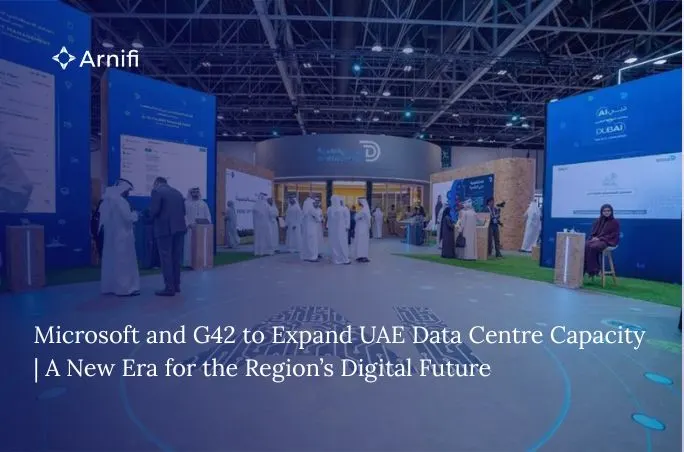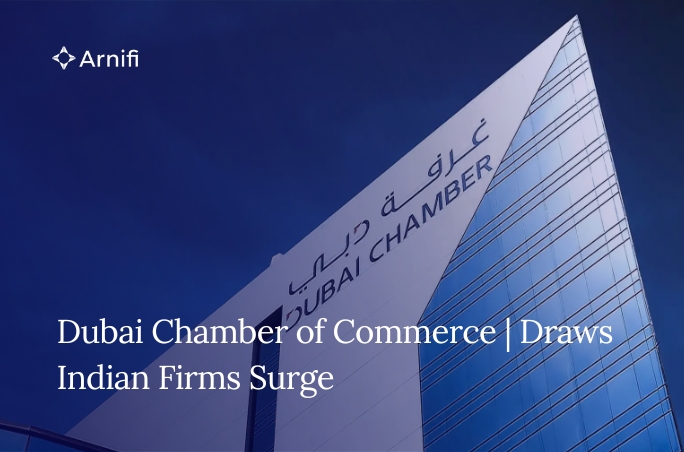Microsoft and G42 to Expand UAE Data Centre Capacity | A New Era for the Region’s Digital Future
by Ishika Bhandari Nov 08, 2025  7 MIN READ
7 MIN READ

Table of contents
Through G42’s subsidiary Khazna Data Centers, Microsoft and G42 plan to add 200 megawatts, which translates to a massive expansion within the UAE data centre ecosystem intended to position the country as a global leader in cloud and AI infrastructure. This particular partnership has been hailed as one of the most significant milestones in the digital evolution of the UAE, and it forms part of Microsoft’s larger investment strategy, which is valued at over $15 billion and aligns with the UAE’s National Digital Economy Strategy.
A Leap in National Digital Capacity
The new development is planned to come into operation before the close of 2026. It will directly improve the data centre landscape in the UAE by providing more secure, efficient, and sustainable digital infrastructure. All these new developments come at a time when the need for cloud, AI solutions, and secure data storage is climbing rapidly around the world. For the UAE, it will be more than just capacity growth; it is much closer to technological sovereignty and increased self-sufficiency.
The installation of new data centers in the UAE will provide a richer architectural foundation for Microsoft Azure’s sovereign cloud services, catering to governments, regulated industries, and private enterprises. It is designed to ensure that sensitive data remains in national territory, answering the increasing demand for digital security, compliance, and resilience. By this, the project will enable the UAE to manage its digital future more confidently and proactively.
The Role of G42 and Microsoft
G42 is perhaps one of the most advanced technology companies in the UAE, and it has really molded the Arab landscape of AI and cloud innovation. With its major grassroots-connected subsidiary Khazna Data Centers, G42 already boasts one of the largest data centre portfolios in the Middle East. In the move to partner with Microsoft, they will couple G42’s regional expertise with Microsoft’s global cloud capabilities to form the most powerful foundation for UAE data centre infrastructure into the next generation.
That collaboration will equally put serious investments in human capital development. Both companies have set their sights on a goal of training one million individuals in the UAE with digital and AI skills by 2027. This initiative will not only support expanding the UAE data centre ecosystem but will also build the talent pipeline necessary to sustain long-term innovation in the country’s digital economy.
Strengthening Dubai’s Position as a Data Hub
Although the whole nation is covered by this investment, the effect on the Dubai data centre segment will be quite huge. Already, Dubai is well regarded as the geo-strategic heart of the Middle East digital economy, with many regional headquarters, tech startups, and emerging global corporations based in the city. Increased capacity for the UAE data centres will, thus, accrue directly to Dubai through better connectivity, reduction of latency, and the influx of new cloud providers and businesses searching for regional hosting solutions.
A stronger Dubai data centre ecosystem means better infrastructure for businesses operating in finance, healthcare, energy, and logistics, industries that are highly data-driven and require ultra-secure, low-latency cloud environments. Besides, by putting the city at the heart of both East and West, Dubai becomes the ideal point of interconnection for global data traffic. Dubai will naturally become the focal point of regional digital transformation, as more capacity is added to the UAE data centre grid.
Economic and Strategic Impact
More than a capacity boost, this expansion implies more commitment towards the UAE’s future competitiveness. It revolved around an already significant contribution of the digital economy to the GDP of the country. With the strengthening of the UAE data centre infrastructure, the contribution is projected to be doubled within the next decade.
Therefore, the benefits accrued to enterprises are tangible. They include access to next-generation cloud infrastructures for AI workloads and big data analytics, along with advanced cybersecurity frameworks. The Dubai data centre market, in particular, will experience increased activity as more international players look to establish operations or partnerships within the city. This cycle will result in positive investment, job creation, and innovation for various sectors.
Challenges and Opportunities Ahead
To see the overwhelmingly positive forecasts for the UAE data centre market, one has to accept that the markets do not come without their own challenges, the most significant of which lie in energy consumption, sustainability, and environmental responsibility. Mega data centres generally require huge amounts of power and efficient cooling systems. For example, operational systems must ensure the big data centre’s positive contribution to sustainability goals and commitments with respect to green energies.
Both companies, Microsoft and G42, are expected to implement advanced technologies to improve energy efficiency and reduce carbon emissions to address those challenges. These new data centres will most likely include renewables as a primary energy source, novel cooling methods, and circular economy principles, enhancing the image of both the UAE data centre and the Dubai data centre markets as sustainable and forward-thinking.
Besides, the other challenge is to maintain constant cybersecurity and protection of data. More and more, as the UAE becomes a global data center, it will also find itself increasingly important for cyber threat targets. In such scenarios, all UAE data centers will necessarily have to adhere to the highest international standards of data privacy, encryption, and compliance with regulations.
Innovation and AI Integration
Artificial intelligence capabilities have found their way into the operations of a data centre as one of the aspects that has been growing very exciting. Both Microsoft and G42 are pioneers in the development of AI. Thus, it is glaring that there will be innovative and flexible infrastructure. The monitoring, predictive maintenance, and workload optimization with the help of AI technologies will add efficiency and resilience to the data centre ecosystem in the UAE.
Dubai’s vision for the next generation of data centre facilities is to have them not just store data but also actively process and analyze it in support of smart city, digital governance, and AI services, including self-driving transportation to real-time energy management. The AI-integrated nature of the data centre will make this possible.
The Road Ahead
All eyes will be on this project as it will reshape the entire digital landscape of the UAE, with construction beginning and the expansion moving on. Operations are expected to begin well before the end of 2026, as the country sets a new standard for digital infrastructure within this region of the world. By putting public and private sector efforts together, the UAE is creating a stellar ecosystem for innovation, security, and sustainability.
More progress will continue to take place within Dubai. Each little improvement in the data centre framework for the UAE will add to Dubai’s standing as a leading regional and global technology hub. Connectivity not only benefits the market by increasing redundancy, but it also improves service availability across global networks.
Conclusion
The Microsoft and G42 partnership to enlarge data centre capacity in the UAE is a landmark initiative, underlining the country’s vision to become a global capitalist in the digital world. Expansion will be buffed up with a surge in data centres in the UAE, enhancing sovereign cloud capacities and economic diversification. All these will bear fruit for Dubai in the shape of a stronger digital foundation, greater opportunities for innovation, and a sharper competitive edge in the global data economy.
Both the UAE data centre and Dubai data centre ecosystems will become more advanced and secure by 2026 compared with previous years. They will thus add to the stature of the emerging “digital heart” of the Middle East and be a beacon of technological advancements for the world.
Top UAE Packages

Related Articles
Top UAE Packages



